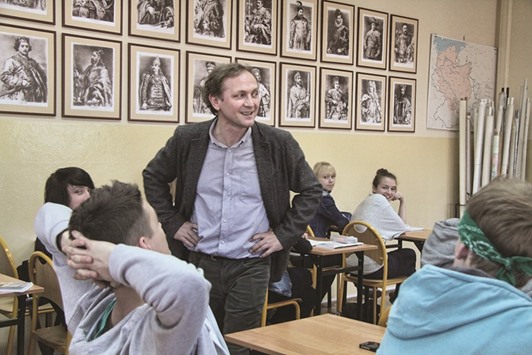Inspired by an incredible true story, award-winning Polish movie Carte Blanche was screened as part of Polish Film Festival currently being held at Katara Cultural Village.
The feel-good movie about a high school history teacher who — fearing he might lose his job and dignity — decides to hide the fact that he’s losing his sight, attracted applause from the audience at the Drama Theatre on the night of the screening.
The movie revolves around the story of Kacper, a beloved history teacher, who begins to lose his sight. The medical diagnosis leaves little hope; due to a genetic disorder, chances are high that he’s facing permanent blindness. Initially heartbroken, he attempts to hide his health problems from his bosses.
His only desire is to keep his dream job and to help his students prepare to the final exams. The only person in the know about Kacper’s problem is his best friend Wiktor. Fighting his dreary fate, Kacper becomes very close with his co-worker Ewa, and at the same time he tries to help a rebel student Klara, who hides a secret of her own.
What makes this story so universal and appealing is that it is not merely about this particular man’s struggle with a disease. It is about every man whose world begins to fall apart and who is faced with a choice to make: to fight or to give in and remain defeated.
How much strength does one need to rise up from their knees and keep on going? Are we capable of writing our life over again, from scratch?
“The world did not seem to need another story about people suffering from a whole variety of diseases but in Carte Blanche it is neither a sickness nor a handicap that is the main theme,” says Jacek Lusinski, the director of the film, in his statement.
“What caught my attention was the process that goes on inside a man; when the only world he knows begins to disappear and has to be replaced with a new one,” he adds.
Despite the main character’s complicated fate, he wanted the film to be filled with optimism and leave the viewer filled with hope. There are, of course, no sudden healings or miracles, but there is something far more important — a belief that the loss of current reality does not equal a loss of meaning, says the director.
An article on a Lublin teacher in fear of losing his job hiding the fact he is losing sight caught the eye of the director. The short news article was very intriguing, he goes on to add. “I found him and began to observe his life. I witnessed the lectures he gave at school, his personal get-togethers and normal every day struggles with his fate,” says Lusinski.
The work on the film was not easy, he acknowledges. It took a long time until they understood the story, the situation of Maciek and the psychological aspect. That said, the film is not Maciek Bia?ek’s biography but shows a certain attitude.
The film tells the story of a loss, which is transformed into something else. The hero loses something, which is then created into something new.
Jacek Lusinski was born on April 30, 1969 in Pabianice. He graduated from Direction of Photography and Television Production Department at the Film School in Lodz. He is a Member of the Polish Film Makers Association. Director, scriptwriter, he also writes songs.
His portfolio includes adaptations for theatre, commercials and documentaries (September 39) and his debut feature The Pixels (2009) was a finalist at Script Pro 2012 — the most prestigious screenwriting competition in Poland.
Carte Blanche is his second feature film.

The director says he wanted to tell a story of hope with the film.
